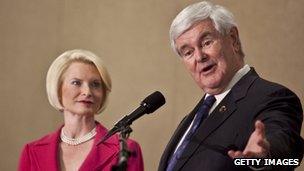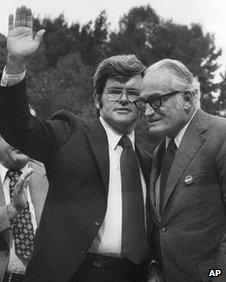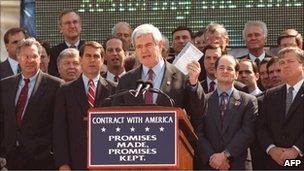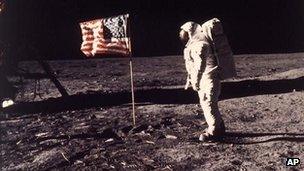Profile: Newt Gingrich
- Published

Newt Gingrich campaigns with his third wife, Callista
Former Republican House Speaker Newt Gingrich tried to pull off one of the greatest political comebacks in US history.
But ultimately, his attacks on the news media and criticism of Mitt Romney's business record failed to convince Republican voters he deserved the party's nomination for president.
In May, Mr Gingrich formally withdrew from the race to challenge President Barack Obama for the US presidency in 2012.
Despite headline-catching pledges, such as $2.50-per-gallon petrol, his campaign had been running on fumes for months.
After amassing more than $4m in debt, Mr Gingrich ceded to the reality he could never overtake Mr Romney's overwhelming advantage in funds and delegates.
Attack dog
Once one of the most powerful and divisive figures in American politics, Mr Gingrich resigned his seat as House Speaker in 1999 - in the wake of Republican losses at the previous year's mid-term elections.

Newt Gingrich in 1976 as a Republican candidate for Georgia's sixth district
Instead of fading into obscurity, he became a conservative policy factory and an attack dog - writing books, producing films, making speeches and appearing on television to criticise Democrats.
Even in his ultimately quixotic run for the party nomination, Mr Gingrich displayed his political resilience.
Despite being written off after a spate of high-level staff defections crippled his campaign the spring of 2011, he remained in the game.
He resurged amid lingering voter dissatisfaction with other candidates, and a series of strong debate performances in which he aimed barbs at the news media moderators.
He went on to win primaries in South Carolina and his home state of Georgia, but could not muster any more victories.
Mr Gingrich brought broad name recognition and a level of political experience and policy knowledge not seen elsewhere in the field of candidates vying for the Republican nomination.
He also carried significant baggage: a history of intemperate remarks and fierce political rhetoric that could have proven a liability.
Lewinsky 'hypocrisy'
He was also damaged by revelations about his post-speakership lobbying and business career, including statements seemingly in opposition to Republican positions on environmental policy and healthcare. Some voters were turned off by what they saw as his record of Washington influence-peddling.

Mr Gingrich's 1994 Contract with America took aim at high taxes, welfare spending - and teen mothers
And, analysts say, his personal past turned off many religious conservatives, who gravitated towards Rick Santorum, the former senator from Pennsylvania, who also dropped out of the race in April.
In the 1990s while attacking President Bill Clinton over his affair with White House intern Monica Lewinsky, Mr Gingrich was engaged in his own extra-marital affair with the woman who became his third wife.
In the 2012 election season, Mr Gingrich's promise to lower gas prices to $2.50 a gallon was seen as a pandering impossibility. He was mocked for calling for a US colony on the moon - that could one day earn US statehood.
By February, the Republican campaign settled into a two-person contest between Mr Romney and Mr Santorum. News media outlets pulled correspondents off his campaign, Mr Gingrich's funding dried up and his campaign debt mounted.
But on he slogged, even as his Secret Service protection cost US taxpayers more than $40,000 a day.
Aggressive attacks
A former college instructor with a doctorate in history, Mr Gingrich was first elected to the House of Representatives from Georgia in 1978.
At the time, the Republicans had been the minority party in the House for decades, and Mr Gingrich found himself a backbencher in a caucus with little influence in the public policy debate.

Mr Gingrich was roundly mocked over his campaign idea for a US colony on the moon
Over the next decade and a half, Mr Gingrich rose through the Republican ranks, earning a reputation for aggressive partisanship and vocal attacks on Democrats - and at times, Republicans.
In 1985, for instance, Mr Gingrich referred to a meeting between Ronald Reagan and Mikhail Gorbachev as "the most dangerous summit for the West since Adolf Hitler met with Chamberlain in 1938 at Munich".
And in 1990, Mr Gingrich's GOPAC committee distributed a memo to Republican candidates advising them to attack Democratic opponents using the words "sick", "traitor", "bizarre", "waste", "corruption", "decay", "anti-flag", "anti-family", "anti-child" and "anti-jobs".
Ahead of the 1994 election, Mr Gingrich told a group of lobbyists Republicans would describe Democrats as "the enemy of normal Americans".
The party's 1994 election manifesto, <link> <caption>the Contract with America</caption> <url href="http://www.house.gov/house/Contract/CONTRACT.html" platform="highweb"/> </link> , promised to end Congress' "cycle of scandal and disgrace" and pledged to curb teen pregnancy, bar welfare payments to teen mothers, prohibit US troops from serving under UN command, institute "effective death penalty provisions", and cut taxes.
Elder statesman
The message seemed to work, and that year Mr Gingrich engineered the Republicans' capture of the House majority for the first time in four decades, becoming House Speaker in the process.
But Republicans were widely blamed by the public for government shutdowns in 1995 and 1996, and in 1998 the party took a drubbing at the polls, with analysts saying Mr Gingrich and the Republicans had overplayed their hand.
Exit polls suggested the public had soured on Mr Gingrich's aggressive tactics and rhetoric, with six in 10 voters viewing him unfavourably.
Under pressure from his caucus, Mr Gingrich resigned the speaker's post.
Since then, he has remained in public life, presenting himself as a sort of elder statesman of Republican politics and building a wide network of non-profit and business enterprises and producing books, documentary films and political position papers.
He has also appeared regularly on Fox News Channel, attacking Mr Obama and the Democrats, even at the cost of consistency (in 2011, he called first for a no-fly zone over Libya, then two weeks later - after Mr Obama and Nato launched one - he said "I would not have intervened").
Mr Gingrich was also criticised last year for suggesting Mr Obama, whose father was born in Kenya, was "so outside our comprehension" that "only if you understand Kenyan, anti-colonial behaviour" can one make sense of his actions.
- Published3 January 2012